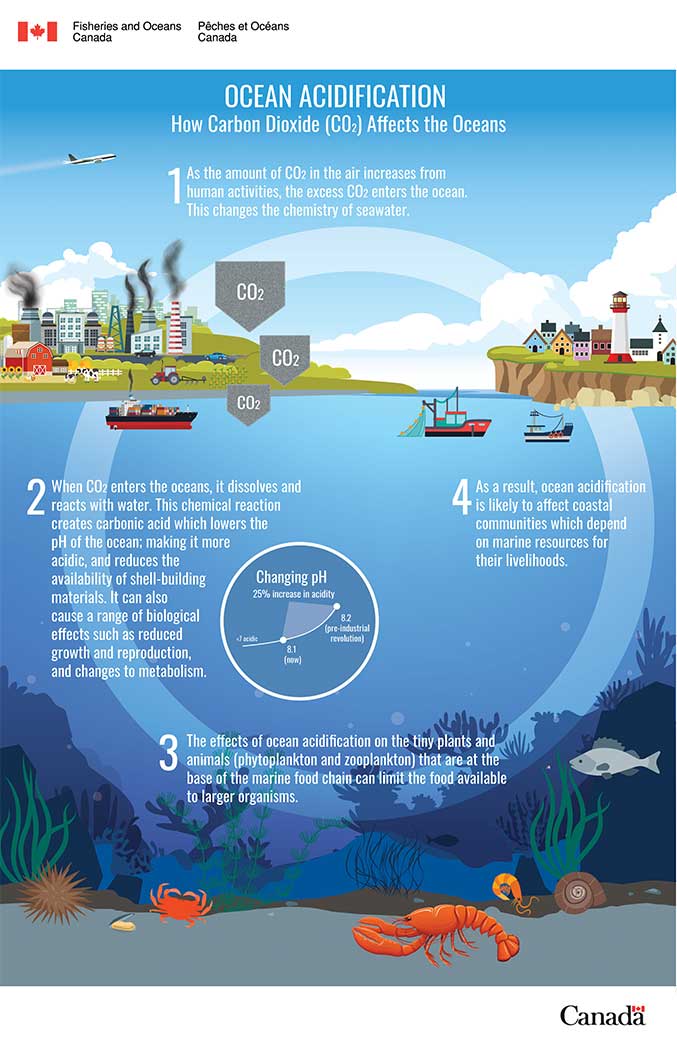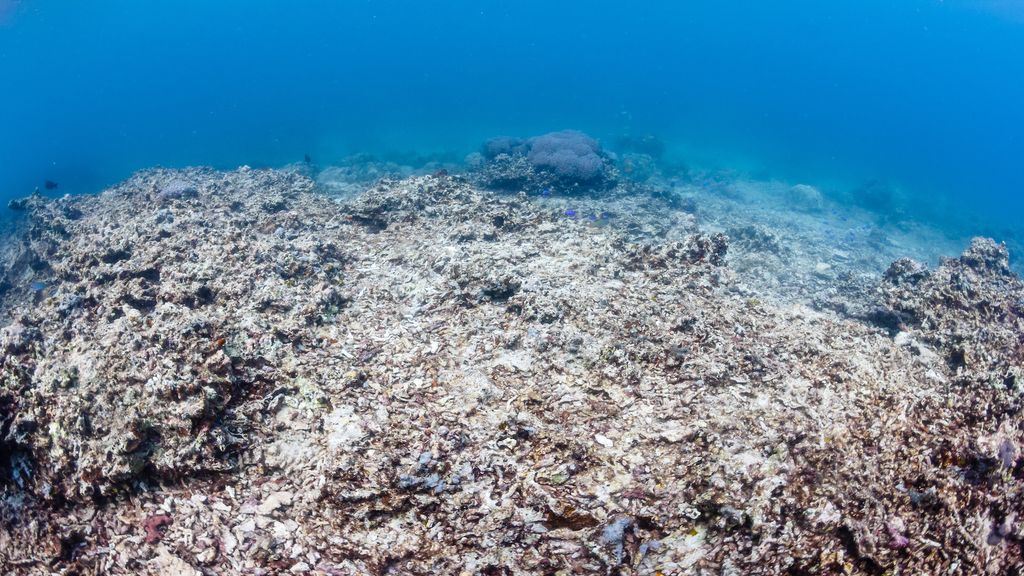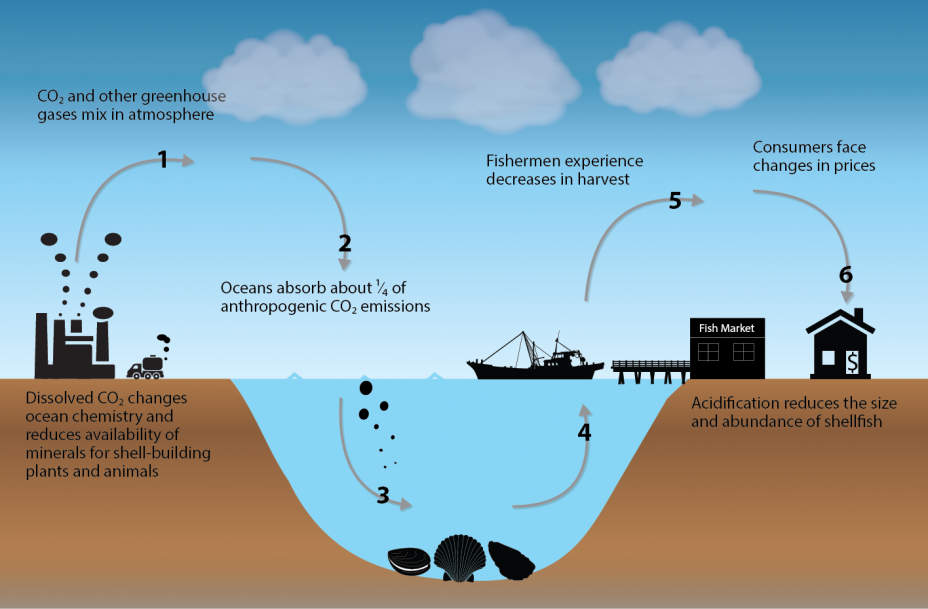Ocean Acidification Images. Carbon dioxide reacts with seawater to form carbonic acid. Certain fish's ability to detect predators is decreased in more acidic waters.
Ocean acidification is affecting the entire world's oceans, including coastal estuaries and waterways. Carbon dioxide reacts with seawater to form carbonic acid. These changes in ocean chemistry can affect the behavior of non-calcifying organisms as well.
Noun. measure of a substance's acid or basic composition. The cause of ocean acidification is clear: carbon pollution released by burning fossil fuels. Studies have shown that decreased pH levels also affect the ability of larval clownfish offsite link to locate suitable habitat.
Acidifying oceans Though the planet's oceans maintained a relatively constant level of acidity almost since the boom of life, research shows that since the beginning of the Industrial Revolution, the oceans have started absorbing more carbon dioxide from the atmosphere. The colder the water is, the more oxygen it can hold. Ocean waves off the coast of New Zealand.
NRDC is working to reduce carbon pollution while also pressing for quick. While such oceanic absorption of atmospheric carbon dioxide is beneficial in the sense that. Certain fish's ability to detect predators is decreased in more acidic waters.
While such oceanic absorption of atmospheric carbon dioxide is beneficial in the sense that. Instead of a smooth, ghost-like surface, the shell appears cloudy, ragged, and pockmarked with 'kinks' and weak spots. Certain fish's ability to detect predators is decreased in more acidic waters.
Satellite images reveal ocean acidification from space. The ability of some fish, like clownfish, to detect predators is decreased in more acidic waters. While such oceanic absorption of atmospheric carbon dioxide is beneficial in the sense that.
Noun. measure of a substance's acid or basic composition. Ocean acidification is a serious but often overlooked concern facing the world's oceans and the shellfish, corals and other creatures that reside in them, say the researchers. Ocean acidification (OA) is the quiet tsunami of environmental degradation.
Ocean acidification is a serious but often overlooked concern facing the world's oceans and the shellfish, corals and other creatures that reside in them, say the researchers. Credit: Ifremer/ESA/CNES Pioneering techniques that use. The international team of scientists published some of their early findings and images in the journal Environmental Science and Technology today.
Certain fish's ability to detect predators is decreased in more acidic waters. Acidifying oceans Though the planet's oceans maintained a relatively constant level of acidity almost since the boom of life, research shows that since the beginning of the Industrial Revolution, the oceans have started absorbing more carbon dioxide from the atmosphere. Noun. measure of a substance's acid or basic composition.
Noun. decrease in the ocean's pH levels, caused primarily by increased carbon dioxide. When dissolved oxygen in water becomes too low, fish and other aquatic organisms can't survive. Ocean Acidification Experiment Have fun doing this simple, fast and fascinating experiment in your own kitchen!
These changes in ocean chemistry can affect the behavior of non-calcifying organisms as well. The final map is built on the idea that humans will not take any steps to reduce emissions and our growing population will continue to rely most heavily on fossil fuels as their source of energy. By taking measurements of seawater over many years.
When these organisms are at risk, the entire food web may also be at risk. The international team of scientists published some of their early findings and images in the journal Environmental Science and Technology today. Second, this process binds up carbonate ions and makes them less abundant—ions that corals, oysters, mussels, and many other shelled organisms need to build shells and skeletons.
The bottom photo shows what happens when the shell starts dissolving in corrosive waters. In areas where most life now congregates in the ocean, the seawater is supersaturated with respect to calcium carbonate minerals. Scientists have observed that the ocean is becoming more acidic as its water absorbs carbon dioxide from the atmosphere.
First, the pH of seawater water gets lower as it becomes more acidic. The top photo shows a healthy pteropod with a transparent shell and smoothly contoured shell ridges. Acidifying oceans Though the planet's oceans maintained a relatively constant level of acidity almost since the boom of life, research shows that since the beginning of the Industrial Revolution, the oceans have started absorbing more carbon dioxide from the atmosphere.
Calcium carbonate minerals are the building blocks for the skeletons and shells of many marine organisms. The bottom photo shows what happens when the shell starts dissolving in corrosive waters. Ocean acidification is a serious but often overlooked concern facing the world's oceans and the shellfish, corals and other creatures that reside in them, say the researchers.
Ocean acidification is a serious but often overlooked concern facing the world's oceans and the shellfish, corals and other creatures that reside in them, say the researchers.
Credit: Ifremer/ESA/CNES Pioneering techniques that use.
The cause of ocean acidification is clear: carbon pollution released by burning fossil fuels. In areas where most life now congregates in the ocean, the seawater is supersaturated with respect to calcium carbonate minerals. Certain fish's ability to detect predators is decreased in more acidic waters.







